Right now it’s kind of hard to see. Right now it’s kind of hard to hear. Right now the world is bright yellow and clattering cheers, all of it reflecting off a sheet of ice and through Bridgestone Arena. Country music stars are waving towels. NFL linemen are chugging beers. Adults are crying and children are squealing and it’s likely that someone, somewhere, is holding a damn catfish to the sky. It’s all both oppressive and exhilarating. And there, in the middle of these 17,000 hockey-drunk humans, up on the Jumbotron, Tim McGraw begins to sing.
"I like it / I love it / I want some more of it."
He’s singing on the Jumbotron because that’s what happens whenever the Nashville Predators score a goal. The crowd cheers, the video plays, the behatted man sings. It’s tradition. But McGraw has never sounded quite like this, because the Preds have never scored a goal quite like this. It arrived just a moment ago, with 2:22 left in the third period of Game 6 of the Western Conference final on Monday. An empty-netter from Filip Forsberg from what felt like miles away. And that’s it. That’s the clincher. The Nashville Predators are going to the Stanley Cup final, where they’ll meet the winner of the Penguins-Senators series.
Something is happening in this city, some collective act of identity-forming and roots-placing, and it is tied to this team. Nashville has long called itself a hockey town, but that has sometimes felt as much like an act of Southern defiance as anything else. Now, though, the diehards have found their place among the sport’s most passionate, the casual fans have drifted toward the extreme, and bandwagoners are throwing themselves aboard without care for the consequences. The city is all in and always screaming.
I should know. I live here. And over the last couple of weeks, I’ve started screaming too.
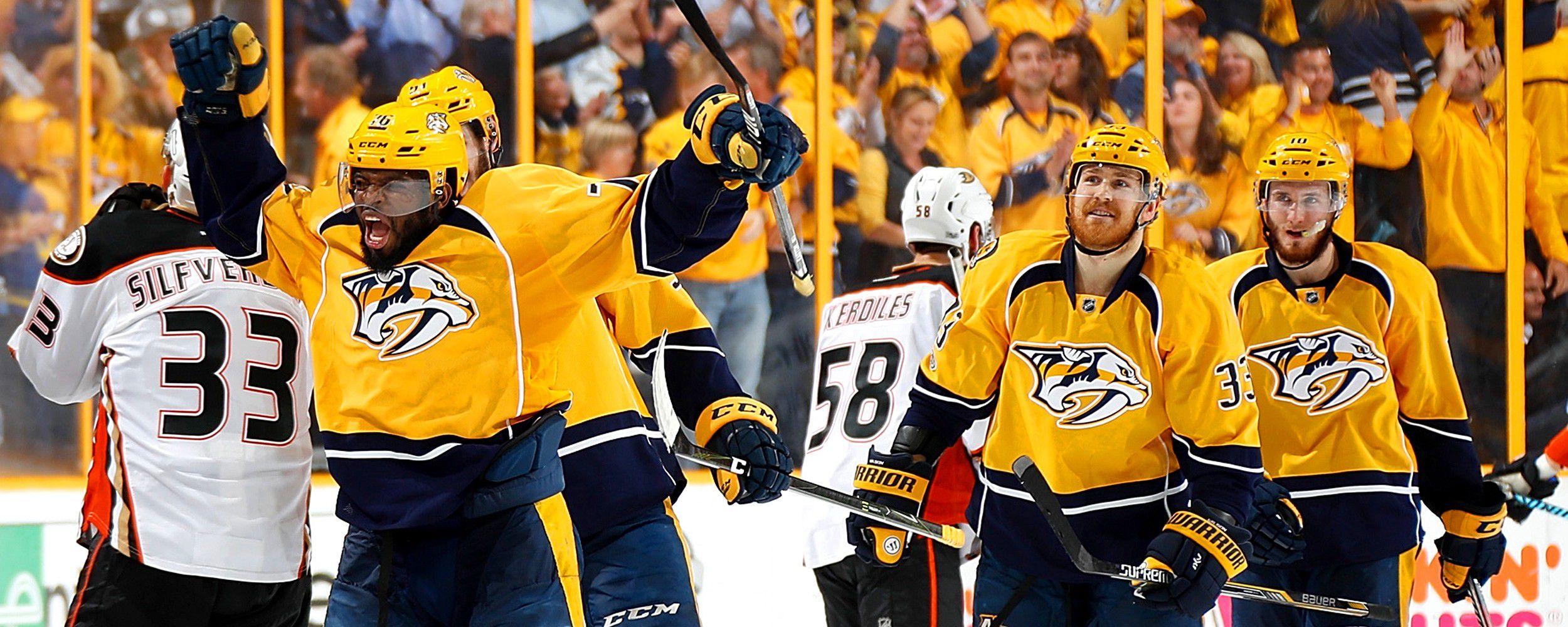
Let’s back up 10 days. It’s a Friday night and I’m sitting at a bar on Broadway, the main tourist strip downtown, watching hockey and thinking about pain. Specifically, its absence. I’m trying to become a fan of the Preds, who are playing the Ducks in Game 1 of the Western Conference final, but here’s how that’s going: I take a bite of a taco. Mid-bite, I hear a horn from the television and groans from the gathered crowd of strangers, and I collect from these context clues that the Ducks have just scored. But rather than shaking my head or groaning in solidarity or even looking up at the screen, I return to my taco. It has brisket in it. It is delicious. When it’s gone, its disappearance will cause me pain, and that tells me something: This taco currently also must be more capable than the Predators of bringing me joy.
I want to change that. I’m a native Nashvillian. Sort of. I was born here, but my family moved away when I was a toddler, and I didn’t return until three years ago, at age 29. I formed my sports allegiances as a child in suburban Atlanta, where I learned all that fandom has to teach about pain. Mostly, that it sucks. But also that only when you give a team the power to hurt you can that same team make you happy.
To my right sits a solitary woman who’s wearing a Preds T-shirt and staring at the television, enraptured. To my left is a bachelorette party, talking about brunch and about shots and ordering a round of Angry Orchards. When I go to the restroom and return they are gone, replaced by an old man who wears a cowboy hat and a mustache, a cigarette dangling from his lips. He is also drinking an Angry Orchard. Nashville’s characters are legion, but every single one of them enjoys alcohol disguised by fruit.
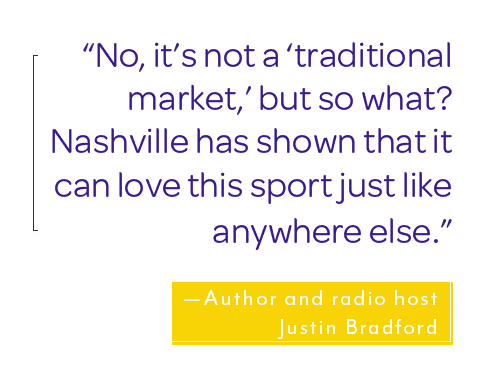
I represent a large slice of the Preds’ bandwagon in that, until now, I’ve never attempted to care about them. In fact, I’ve never really watched a hockey game in my life. I have been in rooms where hockey has been on the television. Once, I even attended and talked and drank my way through a preseason game. But actually watching the action on the ice? Never done it until now. I don’t know the rules or the strategy or the customs, but all of that will come later. I wanted to start this series alone, to enter the sport a little blind. Unfamiliarity can be its own kind of thrill.
Eventually the Preds score: Forsberg, on a deflection, and it all happens so fast that I know he scored only because of the cheers in the bar. Hockey has a randomness to it, at least to my untrained eye, a sense that something momentous can happen in far less time than it takes to bite a taco. After a beat, I register that there has been a goal, and that this is good.
I clap, lightly. It’s a start. I still have a long way to go.
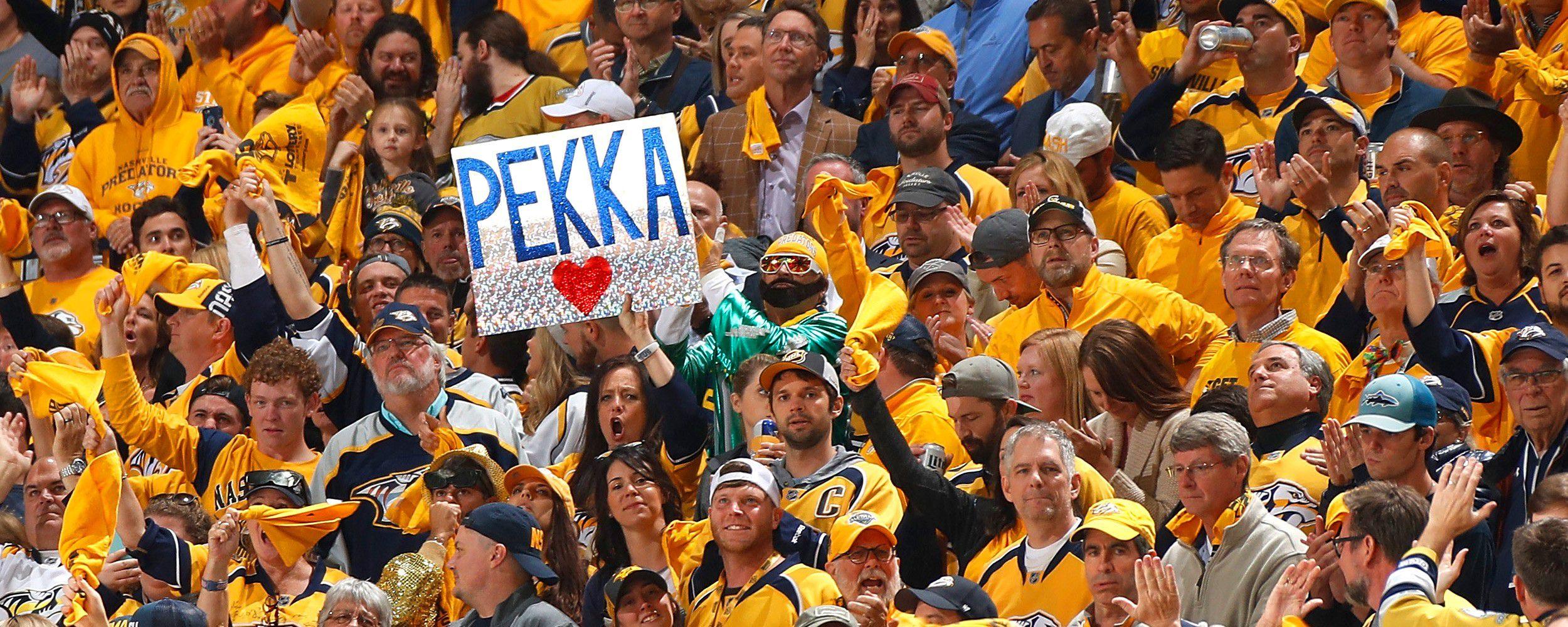
For Game 2, I need help. I come home on a Sunday afternoon to find a large man with an equally large beard sitting on my back porch and drinking a 40, alone. This is my friend Adam. He often wears cowboy boots and he speaks with an East Tennessee drawl, and he works as a hospice chaplain, spending each day with the dying and the families of the dead. He loves hockey. And I get the sense that the story of his hockey fandom can illuminate Nashville’s relationship to the sport as a whole.
Adam explains as he drains his 40 and hops into an Uber on our way back downtown. He grew up in Jefferson City, Tennessee, as a multisport athlete. He admired hockey from afar — the fact that any body type could take to the sport and find a role, and that it took some of what he loved about soccer, his primary sport growing up, and placed a higher value on hand-eye coordination and toughness. He loved the raucousness of the crowds, the fact that watching the sport live meant feeling dangerously close to the action. As an adult, he moved to Nashville. He joined an adult hockey league and got addicted. Over the last few years, he’s taken to the Preds.
"Nashville probably doesn’t have the most knowledgeable [hockey] fans," he says as we take seats at another Broadway bar. "But the passion feels as intense as any other fan base." I keep hearing versions of this: that Nashville cares much more about the Preds than about hockey, that this is a city that rarely tunes into a midweek Blackhawks-Wild game but will go the entire playoffs decked out in gold and blue. Of course, there are countless exceptions, plenty of well-informed fans. But there’s something alluring about developing passion without intimate knowledge, about letting your emotions lead. That’s where I’m headed, I hope, and now it seems to be working. The Preds nearly score and I pound my fists on the bar top. Then they do score — Ryan Johansen, on a breakaway, in an act so smooth even I can recognize its grace — and I find myself yelping with excitement, aping the noises of an actual fan.
Now I care, at least a little, even though I still don’t know what icing means. Adam explains that to me. Over the course of this series, I will learn a few more things too. I’ll learn that Preds goalie Pekka Rinne is a marvel of instinct and angles, a man so attuned to the flow of the puck that he stops shots before I even realize a shot has been taken. I’ll learn that he’s the latest character in a deep strain of hockey lore: the "hot goalie" who finds some higher plane in the playoffs and lifts his team beyond what anyone should reasonably expect. I’ll learn that Forsberg has a deftness that can be mesmerizing, that P.K. Subban is as thrilling away from the puck as he is on it, that coach Peter Laviolette is a brilliant tactician whose tactics I am years from being able to understand.
I am learning these things alongside so much of the rest of Nashville, and I am learning them from people like Adam and from the other fans who have already given something of themselves to this team, the ones for whom this is not just a fun way to spend their spring but the culmination of years of emotional investment.
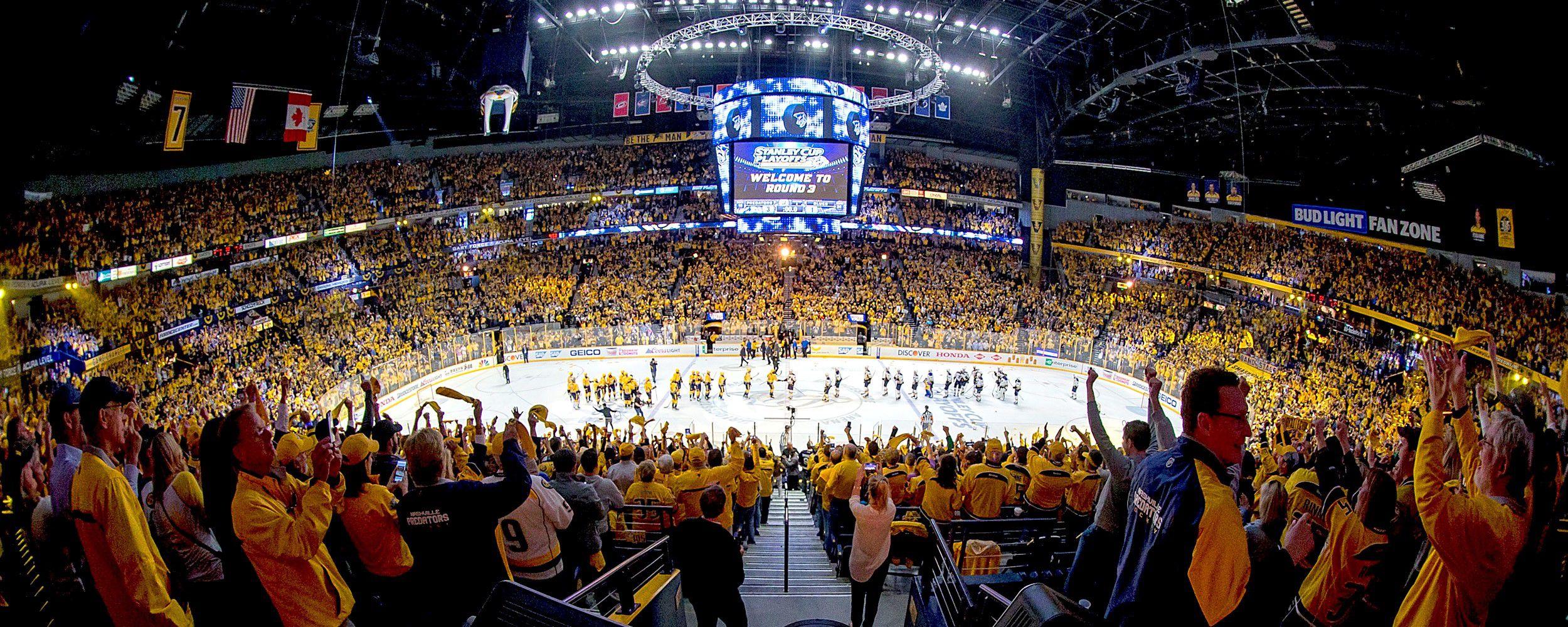
People like Justin Bradford. He’s the author of Nashville Predators: The Making of Smashville, a 2015 history of the franchise, and the host of a hockey show on local radio. He moved to Tennessee from Michigan as a child, part of a mass migration between the two states. In 1990, General Motors opened a plant in Spring Hill, 30 miles south of Nashville. Thousands of laid-off auto workers followed, including Bradford’s father.
For years, these displaced Michiganders followed their beloved Red Wings from afar. When Nashville got the Predators as an expansion franchise in 1998, Justin had the same thought as many others: "Finally, I can watch the Wings in person." Some sports allegiances serve as a connection to our present, others a connection to our past. Bradford always told people, "I live in Tennessee, but I’m from Michigan." It didn’t matter that he’d lived in his new state longer than his old one. He loved the Wings and the Wolverines. That made him a Michigander. Nothing else.
But then he found himself attending Preds games even when they weren’t playing the Red Wings, and soon after that he found himself cheering them on against other teams. He was one of many, a group known as the "Pred Wings," all part of the same relocation and all facing the same conflict — stick with the Wings or embrace the Preds? Once, Bradford showed up to a Nashville-Detroit game wearing a Red Wings jersey and a Predators hat. When Detroit legend Steve Yzerman retired in 2006, Bradford realized that the Wings he’d loved as a boy were no more. He gave himself permission to move on.
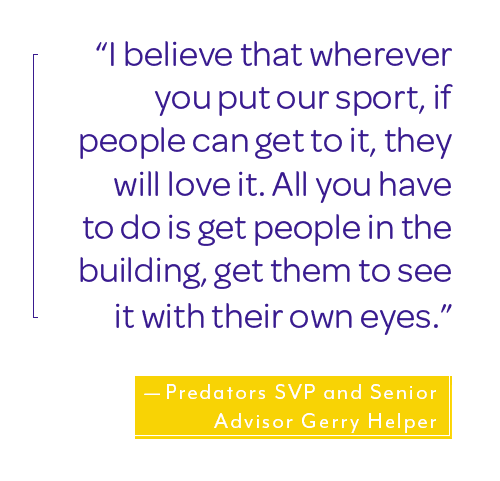
"Part of it is realizing that I love this team that’s right here in front of me," he says. "But it’s also realizing something about myself. I can’t really say, ‘I’m from Michigan but I live in Tennessee,’ anymore. I’ve spent more time here. I have more connections here. I might not sound like it, but I’m a Tennessean now." He got season tickets in 2008–09 in the "Cellblock," Section 303, home to the rowdiest supporters. By the time the Preds beat the Wings in the 2012 playoffs, Bradford had thrown his fandom fully into Nashville.
As he’s grown, he’s watched the fan base grow with him. "If I had to describe Nashville fans in two words, I would say: exponentially maturing," Bradford says. While he and the other "Pred Wings" held a deep appreciation for the sport from the start, many Nashville natives had passion that outstripped their own knowledge. "People have always loved this team, but they haven’t had the appreciation of the game. This place would be loud, but not always at the right moments. Now you see the sophistication. Now you see someone killing off a penalty and the place is going nuts, showing appreciation. No, it’s not a" — and here he does sarcastic air quotes — "‘traditional market,’ but so what? Nashville has shown that it can love this sport just like anywhere else." I tell him about myself, about my own lack of interest in hockey and efforts to connect with this team. I wonder if people like me are annoying to the diehards, if it feels like we’re enjoying a moment we haven’t earned.
"No!" he says. "We need that. We need all of it. Everyone. Because the knowledge comes after the passion. And then when you get the knowledge you get more and more passion. And yeah, some people are going to roll their eyes, but so what? It’s so much fun to introduce people to this sport and see them get excited.
"That’s the sort of thing that happens only in runs like this one."
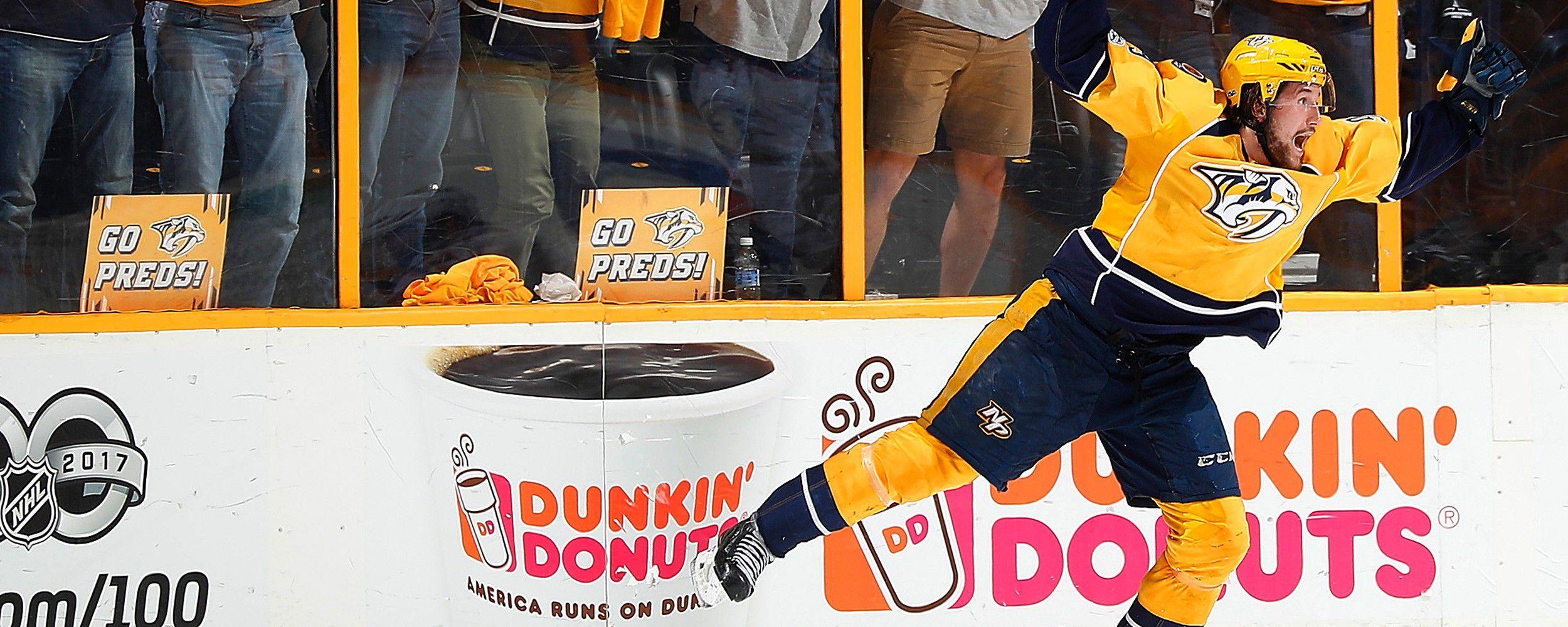
My education continues on the morning of Game 3. I take a seat in the office of Gerry Helper, a Predators SVP and senior adviser, and a man who has worked for the team since before it even existed, back when it was nothing more than words on paper, an idea not yet enfleshed. Helper moved to Nashville in 1997 as part of the group that founded the Preds, and he came from Tampa Bay, where he’d helped to found the Lightning. "There’s something about starting a new franchise," he says, "that’s exciting in a different way than joining a franchise with a long tradition. You don’t have to be afraid to try new things. There is no model to follow. You’re not bound by traditions that say, ‘You have to do this,’ or, ‘You have to do that.’ It’s a little bit liberating."
Helper had never been to Nashville until he came to town for his interview with the Preds, but he played a hand in creating the deep-fried hockey culture that now surrounds the team. Many of this franchise’s fans live at the intersection of hockey and college football and NASCAR. They wear thick beards and team-colored sundresses, and they throw catfish on the ice and sing along to country bands between periods and hold signs like the one I’ll see later in the series that says, "Rednecks Make Better Hockey Fans."
That started with Helper and other day-one employees, who arrived here excited by the chance to make hockey work in this region. Momentum had built in markets such as Tampa Bay, Los Angeles, and Dallas, and Helper and others believed that anywhere they took their sport, fans would follow. Rather than trying to import hockey culture to the South, they tried to rebuild that culture in the city’s image. To sell season tickets before the inaugural season, they started an ad campaign built around country music stars, from Garth Brooks to Martina McBride to Vince Gill, pictured on billboards with their two front teeth blocked out and the phrase, "Got Tickets?" The Preds wanted to connect their franchise to the city’s existing culture. They weren’t yet selling a team, just an idea. Says Helper: "We wanted people to come and have a good time for a few hours. If they did that, over time they would build a connection to the team."
In 2007 a potential buyer showed interest in moving the team from Nashville to Hamilton, Ontario, but after a group of local investors swooped in to buy the Predators and keep them in place, roots of a winning culture deepened. The team has now earned a spot among the NHL’s better-run franchises, with a robust farm system, a shrewd front office, and trips to the playoffs in nine of the last 12 years. And while many adults may love the team itself far more than the sport it plays, Nashville’s next generation is growing up fully invested in hockey culture. Rinks have proliferated. Youth leagues are packed to capacity. In 1998, six local high schools fielded hockey teams. Now there are 18. Says Helper: "Kids are willing to try new things more than adults are. So you’re seeing the real growth come from them."
Helper admits he’s something of a hockey evangelist. He goes wide-eyed when he talks about his love of the sport, from playing boot hockey on frozen ponds in Buffalo as a child to working his way through several markets in the NHL. He insists that the sport’s fan base is as passionate as any, that the love comes not from the culture that surrounds the game but from the game itself. "I believe that wherever you put our sport, if people can get to it, they will love it," he says. "All you have to do is get people in the building, get them to see it with their own eyes. The sports fan in Albuquerque — he can’t get to our sport. He’s never going to love it. He’s going to be a casual football fan or basketball fan, and that’s OK. But if you put us close to someone, we will pull that person in."
I tell him about my lack of experience and about my mission. Tonight I’ll be on press row for Game 3 of the series, and it will be the first non-preseason game I’ve ever attended. I ask him what to look for. He leans forward and grins.
"Just watch," he says. "It sounds silly, but it’s really that simple. Just sit back and let yourself watch.
"There are moments in that building where you just look around and go, ‘Wow. Wow.’ Maybe it’s when the team comes on the ice. Maybe it’s during the anthem. Maybe it’s a spontaneous standing ovation during a TV timeout. But there are moments where you can feel the passion and spirit of the fans in a way that’s overwhelming."
He smiles.
"I think you’re going to experience something truly special."
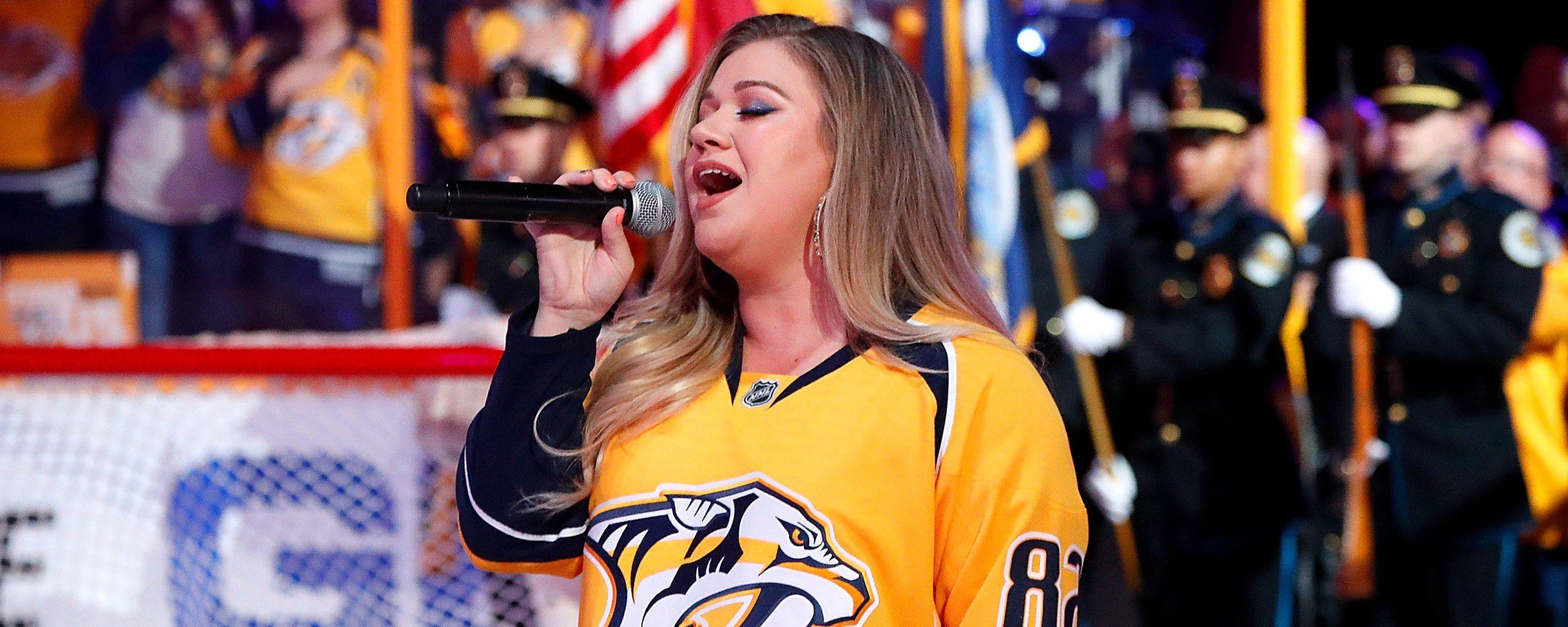
This is the thing I’ve heard since the first time I ever heard anything about hockey. It’s just different in person. Time and again, that has been the message. If you want to appreciate the sport, you can’t watch it on TV. You have to go.
So now it’s a few minutes before puck drop and I’ll admit that I have chills. I’m sitting on press row in between two reporters who are doing the sorts of things I do at basketball and football games — gathering ephemera, organizing notes, scrolling through Twitter — and I’m staring at ice and watching hair raise on my arms. The noise is both overwhelming and inviting, the kind of sound that you can almost see. "Run This Town," the Jay Z and Kanye and Rihanna song, comes over the loudspeakers, and the Preds logo appears on the ice, and the ice itself seems to send the energy of the crowd back into the stands.
That’s the thing about the Preds: They make it so easy to like the experience that you don’t even have to know the sport. Before Game 3, Keith Urban sings the national anthem. Later, it’s Kelly Clarkson, then Trisha Yearwood. All of it is kept secret until the moment the stars walk on the ice. Not only that: There’s anthem drama. The guy who’s been singing it for years has been sidelined, and he’s pissed. When the game begins you might see the camera flash to Marcus Mariota, or to Nicole Kidman, or to the entire Titans O-line, at least one of them shirtless and all of them chugging beers. It is a party attached to a sporting event, and it just so happens that the team playing is climbing toward the pinnacle of its sport.
When the game does start it becomes clear why everyone has always said that this sport is best enjoyed in person. Even from the press seating up on the third level, the action feels close enough to touch. With a view of the full ice, the game’s chaos organizes itself. Randomness assumes order. I don’t know enough to understand what strategies are at work, but it’s now clear that something is. The rhythms of the crowd reflect those on the ice in a way that can seem hypnotic. This feels less like a spectator sport than one that just happens to have 17,000 players.
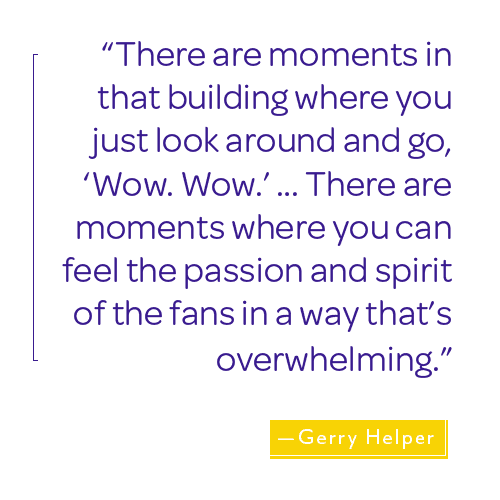
The first period passes, scoreless, and most of the second period passes that way, too, until the Ducks’ Corey Perry scores on a power play with 4:25 to go. The third period begins and the crowd grows a little uneasy, a little nervous, until Forsberg scores from what looks to me like an impossible angle but appears to all others to be just a standard goal. Now things are tense. Now volume is growing. People are standing and seem to have no intention of returning to their seats. As the game winds down, a Nashville goal begins to feel inevitable, like a football team in the midst of a 17-play, 98-yard drive. The Preds score, but it’s waved off and the crowd boos. They score again, and again it’s waved off and again the crowd boos. I do not understand what is happening. I do not turn to the hard-working hockey journalists next to me to ask. I understand only that there has been some kind of interference, and that this is not allowed, and that now this large group of humans with whom I share a city are throwing towels on the ice, and they are very loud, very angry, and their loudness and anger tell me that I should be loud and angry too.
I’m not, though. This is press row, and you don’t do that sort of thing here. I can have feelings, but I can’t express them, and sometimes when you can’t express feelings you can will them not to exist. If the Preds were a team with the power to actually hurt me, then even sportswriter decorum wouldn’t be enough to keep me from feeling that pain.
Watching from press row is about spectacle, not connection. The spectacle is amazing, yes. It is exactly as Helper predicted. But it’s not what I’m after, not right now. Nashville goes on to win Game 3, and a couple of nights later, after the first period of Game 4, I stand up. In the middle of one of the biggest games in my city’s history, I leave.
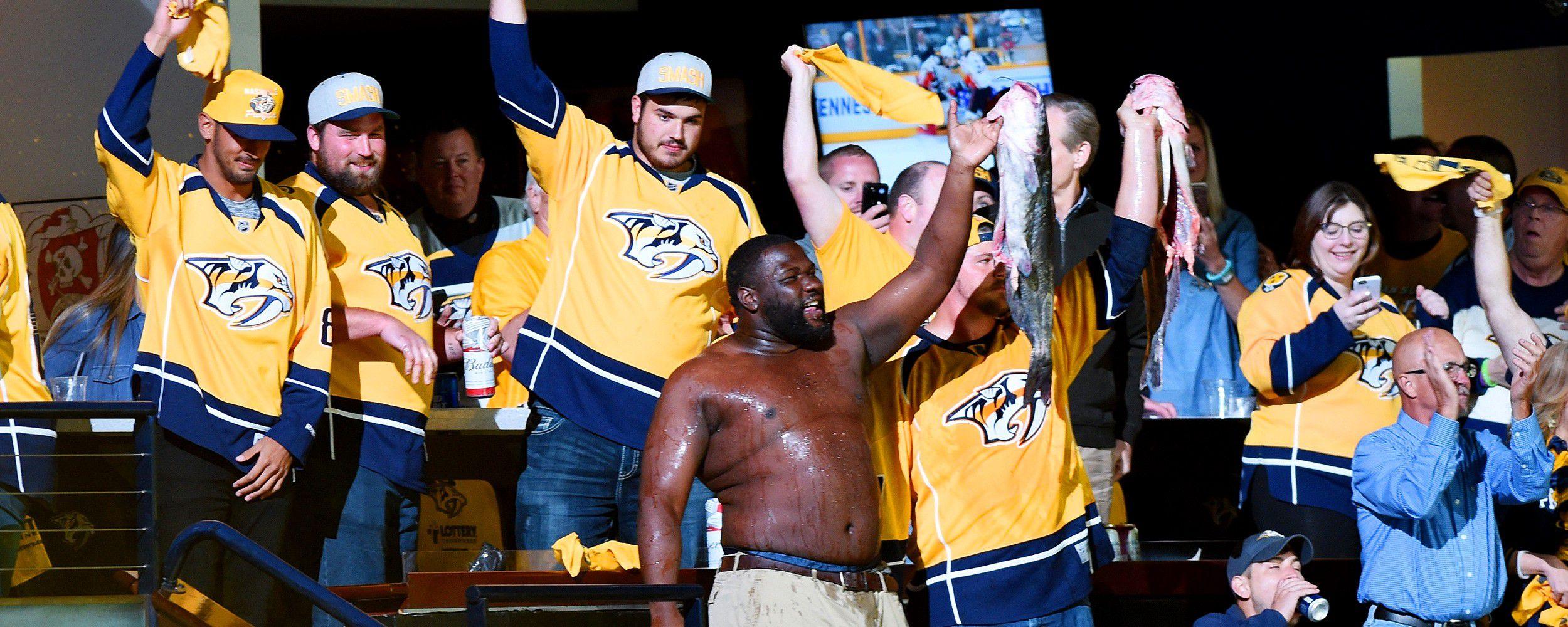
Sometimes, on spring and summer evenings, Nashville can be so beautiful it makes you ache. There’s nothing special about the land here, not really. There’s just a river, and in the distance you can see a few hills, but they’re not the dramatic kind, not the painted-on topography that you would find somewhere farther west. It’s the sky. The atmosphere seems to swirl together in ways that are new each evening. You’re sitting or walking, and you’re lost in thought or conversation or a pool of your own sweat, and then you look above you and for just a second you forget to breathe.
Right now it’s like that. Across the street from Bridgestone Arena, a couple thousand people are seated on lawn chairs, scattered around the Music City Walk of Fame Park, watching the game on a projection screen. I wander through them until I find my sister, Liz, who is sitting with her fiancé, Andy, and a couple of others, watching the game. I sit down. Liz offers me a water bottle filled with vodka. I remove my press credential and take a sip.
Like me, Liz is trying to get into the Preds. She spent much of her 20s bouncing around the world teaching English, but now Nashville is starting to feel like the place to build the next chapter of her life. I guess this is one of the ways we attach ourselves to new cities. We sit among the people with whom we share a home, and then we scream and clap at the same things that make them scream and clap. We put on their colors. We try, awkward as it may be, to assimilate into their tribe.
At the moment, that tribe is frustrated. The Preds fell down 1–0 in the first, and now they fall down by another goal in the second, 2–0. As the game winds its way into the last 10 minutes, the crowd goes a little languid, until finally the Predators show signs of life. With about six and a half minutes to go, Subban fires a laser from near the blue line and into the back of the net. Nashville’s back in it. 2–1. I stand and I scream, and I high-five my sister multiple times. I’m excited. For the first time all series I find myself feeling anticipatory, hoping for another goal.
It doesn’t look like that will happen. The clock dwindles and the Preds seem headed toward a loss. I start thinking about that pain thing again, and then I start talking to my sister about those feelings and she listens, because indulging their blowhard older brothers is what little sisters often do. I say that I hope the Preds score, but that if they don’t, it won’t hurt. I’m not invested enough for that. I like this new thing in my life, this team, but I haven’t spent enough time with it to become vulnerable. And so I think that getting excited about its successes feels a little cheap.
And we should stipulate here that sports emotions are kinda bullshit, that this is the setting where we try on smooth-edged versions of the stuff that makes up real life. Losses are not real traumas, and late-game jitters are not real fears. Big wins, likewise, pale next to life’s actual joys. And we should stipulate, also, that by now I’ve had a few pulls of the vodka, and I’m feeling more than a little maudlin, and so I’m giving all of this a weightiness that it may not really deserve. My sister keeps nodding and indulging my rambling, but I know that sometimes it’s better to just shut up and watch the damn game.
And that becomes easier, because with 35 seconds remaining, Forsberg forces the puck into the net. I don’t know how it happens. I’ll watch replays, and I still won’t know. There are bodies and there are sticks and then all of a sudden a horn is sounding, and everyone around me is screaming, and I’m on my feet and I’m screaming too. In front of me, there’s a kid, maybe 17, wearing a buzz cut and a jersey and a face full of freckles. He turns around and tries to high-five me but we miss each other, and all of a sudden we both go in for the hug. And, yeah, I don’t have too many emotions invested, and no, this excitement isn’t the highest of sports highs, but I don’t know, it’s still exciting to know strangers are seeing what you’re seeing, to have your experience reflected in theirs. And sometimes, regardless of how much you’ve given of yourself to something, it’s nice to have an excuse to reach out for the closest human and to find them reaching back.
So here it is: I like hockey now. At least a little bit. And I like the Predators. Probably a little bit more. And that has to do with the sport, yes, but it has even more to do with this city. Nashville is experiencing something thrilling right now, and I want to experience it too. In a few minutes, the Preds will lose this game. A couple of nights later they will win Game 5, and then later Game 6, and the streets will turn gold, everyone drunk and high-fiving, street musicians making up hockey songs on the spot. I still haven’t invested enough in this team for them to have the power to hurt me, but maybe this is where it starts. Maybe participating in the rituals of caring can will the caring to exist.
This playoff run has been so filled with dramatic moments, but the one I’ll keep thinking of is this: Outside on the lawn near the end of Game 4, a game the Preds will lose, standing on this impossibly gorgeous evening, in between the sister I’ve known her whole life and the stranger I’ve hugged but never properly met, all of us in different stages of our relationship to this team and to this city, dumb and euphoric and desperate to see what happens next.
